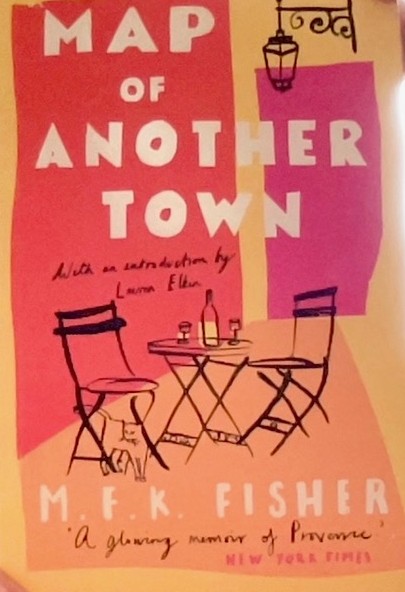Inspiring Older Readers
 posted on 02 Apr 2024
posted on 02 Apr 2024
Map of Another Town by M.F.K. Fisher
From the 1940s to the 1970s and beyond, the American writer M.F.K. Fisher was regarded by many – and especially by other writers – as one of the great prose stylists and food writers. Auden said he didn’t know of anyone in the US who wrote better prose; Updike called her ‘a poet of the appetites’.
When I first began to read her in the early-90s her books were actually quite hard to come by, often found only in rather expensive imported American paperbacks, which I’ll admit I felt added to their glamour. In the intervening years her star has risen again and she seems to be reacquiring the wider readership she deserves.
The more I read of her, the more I came to realise how wrong it was to regard her as a sort of American Elizabeth David, a food writer-intellectual: her real subject is life and how to live it. I don’t think any single book of hers makes this clearer than the rather curious and at times troublingly dark Map of Another Town.
In the 1940s, Fisher experienced a number of personal hammer-blows: her parents died, her second husband took his own life after a long illness, and a few years later so did her brother. In addition, like many millions, she was exhausted by the war. She found herself craving the sensuous, more care-free life she had experienced in her younger years living in France, and between 1954 and 1961 she and her two young daughters lived for some of that time in Aix-en-Provence, the historic Roman city and once the medieval capital of Provence. Map of Another Town is her memoir of that time.
But, barely a decade after the end of the war, this was a very different France than the one she had previously lived in. She herself is unmoored by grief and exhaustion, and for those around her France’s ignominious defeat and occupation, and the brutalities of post-Liberation purges and retribution are vivid, living memory. But this is not an unbearably bleak war-memoir: as is often the case with Fisher, one has to read not just closely but between the lines in order to begin to grasp the personal circumstances in which she is writing.
In twenty-one linked essays Fisher explains her profound love for Aix while also hinting at what she must overcome in order to remain there: rather than the sophisticated, confident ‘self-styled culinary raconteuse’ she considers herself to be, she feels ‘oafish’, a vulgar uncivilised American, or worse, disembodied, a barely visible ghost.
In ‘A Familiar’, she is stranded overnight on a railway platform having been given the wrong information about the train she must catch, and finds herself ‘haunted’ by a dramatically tall, beautiful, foppish boy whose extraordinary appearance is added to by a strange familiarity. The boy and his girlfriend appear engaged in some strange, self-regarding game. ‘It was a test, I said to myself…a test of what…a test of my strength, of my courage…but against what? […] I was not yet sure if they were evil, but this was the chance to find out if I was good.’
In one of the finest pieces, ‘17 Rue Cardinale’, she dissects the snobbery of a Madame Parblentier, one of the formerly grandes dames with whom she takes lodgings. ‘In a kind of insane denial of reality,’ she writes, ‘the women like her (many of them saddled with senile husbands or horribly mutilated sons or unfortunate grandchildren kept as much out of sight as possible), these exhausted women, in background very much like my own aunts and their friends, tried to keep their homes running for ‘paying guests’. They tried, and doggedly, to pretend that it was really intimates they were sharing their homes with, and kept them bathed in an utterly false atmosphere of well-being and charm and interesting meals. Madame Parblentier’s house ‘sparkled with that particular waxen clutter of the upper French bourgeoisie’, Fisher says, but ‘The sunlight poured in through the beautiful windows and stripped Madame’s face like a scalpel, seeing viciously into the essence of her, the skin within the skin’.
As ever, these pieces contain indelible, exquisitely captured moments; but there is little of the long, relaxed, voluptuous gourmandising Fisher sometimes writes about. It is a recollection of a beautiful place in a desperate time, written with Fisher’s trademark courage and dignity and stoicism and may well be her finest book. Superb.
Daunt Books publish this and four other titles in elegant, nicely produced paperbacks.
Alun Severn
April 2024
M.F.K. Fisher elsewhere on Letterpress:
Colette at the table: M.F.K. Fisher